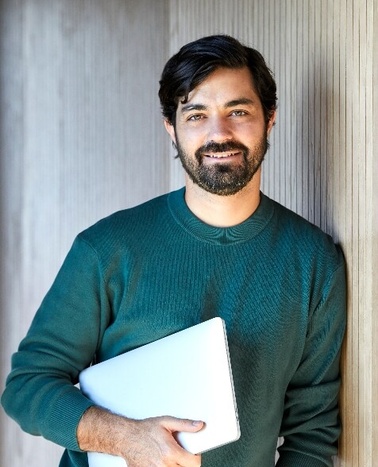
Matías Iturralde
Matias is an Argentinean finance manager with over 18 years of professional experience, which includes roles such as CFO and Co-founder in various tech companies. His career journey started in Corporate Finance consultancy and M&A associate positions, before transitioning to entrepreneurship and technology several years ago.

"Having walked the challenging path of entrepreneurship myself, I understand the complexities and the solitary nature of the journey."
How do you add value to startups in your role as a venture partner at Rally Cap VC?
As a part-time venture partner at Rally Cap VC, I play a crucial role in scouting startups within my region, with a particular focus on fintech in Latin America. Drawing from my extensive background in finance and diverse experience as a founder and CFO in various tech startups, I bring an understanding of what makes a startup ready for success in today's rapidly evolving landscape. However, my involvement goes beyond mere identification; it extends to collaborating with VCs and leveraging my network to facilitate strategic partnerships. My financial knowledge and entrepreneurial journey give me a multifaceted perspective to not only recognize opportunities but also actively contribute to shaping their trajectories.
As a successful tech co-founder, consultant and mentor, what changes have you seen in the industry over time? And how can tech startups today catch investors’ attention?
While I would not label myself a successful business founder, my entrepreneurial journey has been a transformative experience, especially during challenging moments. It has uniquely positioned me as a valuable consultant and mentor for startups.
Over time, I've observed a significant shift in investor priorities, moving toward a more unit-economics-focused approach rather than the previous emphasis on explosive growth. This shift presents unique opportunities for startups that prioritize profitability or have successfully bootstrapped their businesses, challenging the conventional belief that funding rounds are an absolute necessity.
Additionally, the increasing interest in B2B businesses by VCs aligns with these changing dynamics. B2B-focused startups often exhibit characteristics, such as profitability and longer customer lifetime values, that pave the way for more sustainable, long-term success.
You already had a remarkable career in the finance industry: why decide to pursue the Executive MBA? How does the program add to your existing skill set?
I believe that an Executive MBA widely transcends financial knowledge. In today's dynamic business ecosystem, there are too many dimensions that demand attention and the pace at which the world is evolving renders even the knowledge acquired during my undergraduate studies outdated. With several years of work experience—including management roles—the decision to pursue an Executive MBA is driven by a quest for a more comprehensive and updated understanding of business.
As an entrepreneur and a CFO in startups, I've gained a lot of hands-on experience in business management. At the same time, the startup environment seldom gives you the time to stop and try to understand the big picture of the business. The Executive MBA offers a unique opportunity to pause, reflect and gain insights into diverse facets of business management. It's not just a theoretical pursuit; it's a practical exploration that I believe will equip me with the multifaceted skills required to navigate the complexities of today's business landscape effectively.
Can you tell us more about your voluntary work and your role as a mentor with the Founder Institute, Emprelatam and KOI Ventures?
As a mentor in various startup accelerator programs, my primary focus is to share my experiences and offer guidance to aspiring entrepreneurs. Having walked the challenging path of entrepreneurship myself, I understand the complexities and the solitary nature of the journey. Launching and sustaining a business requires attention to numerous aspects and entrepreneurs may find themselves overwhelmed and in need of advice. In my mentoring role, I strive to help entrepreneurs discern what is truly important. I guide them on prioritizing KPIs and essential financial reports in the initial stages while emphasizing the importance of letting go of 'nice-to-haves' for the future. I believe that, especially in the startup world, time is the most valuable asset an entrepreneur possesses. By providing practical insights and streamlining their focus, I aim to contribute to their journey toward building successful and sustainable ventures.
How do you feel about the continued convergence of tech and finance? What will innovations like AI mean for the future of the industry?
I perceive the ongoing convergence of technology and finance as a transformative force driven by two distinct characteristics within the discipline of finance. On one hand, operational aspects in finance often involve manual and inefficient tasks that need automation. I believe AI, in particular, will play a crucial role in eliminating these tasks, thereby enhancing efficiency and accuracy.
However, the strategic focus of finance, with its wide-ranging scope in an organization, presents a complex challenge for complete automation. The dynamic nature of today's world demands adaptability—and an incredible understanding of many aspects of a business at the same time. Trust in algorithms, though evolving, remains a challenge due to the ever-changing landscape and multifaceted considerations. In this context, I envision AI as a powerful copilot in the future of finance, collaborating with human expertise to navigate the complexities, automate routine tasks and provide valuable insights for more informed decision-making.
What prompted you to enroll in the Executive MBA program?
I always aspired to pursue an MBA, but I wanted to undertake it with a more substantial background in business administration. The Executive MBA was the natural choice, given its emphasis on participants with considerable business experience. Additionally, the prospect of working and studying simultaneously appealed to me, as I believe that the mind absorbs knowledge in a different and more practical way under such conditions.
In my exploration of MBA programs, IE Business School stood out as the clear choice. It distinguished itself as a renowned institution that seamlessly integrates modernity, technology and a practical focus, setting it apart from many other MBA programs. The blend of presential and online classes, along with a curriculum that emphasizes real-world applicability, resonated with my vision of a comprehensive and forward-thinking business education. IE Business School's commitment to innovation and relevance aligned perfectly with my goals, making it the ideal course for my Executive MBA journey.
What were your first impressions of Madrid during the residential periods?
My impressions of Madrid are always incredibly positive. It's a beautiful city with a very welcoming atmosphere, especially for foreigners like myself. One of the aspects I appreciate the most is the sense of feeling at home. Coming from Latin America, being able to communicate in Spanish certainly adds to this sense of comfort.
Can you share some of your most memorable moments during your residential periods in Madrid?
Integration and relationship-building are crucial for making the most out of the residential weeks in Madrid. Although technology plays a significant role, the experience of presential classes stands out as a truly memorable moment. The in-person interaction with professors and fellow students adds a valuable dimension to the learning process.
Beyond the academic setting, dinners and gatherings outside of school contribute significantly to getting to know each other. These informal settings foster a sense of camaraderie and provide a platform for cultural exchange, showcasing the richness that comes from the diverse cultures and nationalities within the IE Business School community. These moments of connection and understanding have not only enhanced my academic experience but also created lasting memories.
What are some challenges you’ve faced during the Executive MBA and how did you overcome them?
One of the greatest challenges I've faced is finding the time to balance the program with my professional and personal commitments. As an Executive MBA student, the demands of work, family and other responsibilities can be overwhelming. Overcoming this challenge is not an instant process; rather, it requires a strategic and disciplined approach. To navigate this time constraint, I adopted a methodical and disciplined approach. Having a well-organized agenda coupled with effective time management tools became crucial in ensuring that I could fulfill my academic requirements without compromising on my work or family obligations.
What has been the highlight of your experience in the program so far?
The Executive MBA has been full of surprises for me, with two standout moments that have truly enriched my experience. Firstly, while I was aware of the blended model of the program, witnessing it in action was a revelation. I’m a strong advocate for remote working and studying, but the face-to-face weeks created a unique camaraderie among colleagues and the program management team that made it exceptionally special. The personal connections forged during these weeks added a human touch to the program, complementing the flexibility of its online components.
Secondly, I believe that the concept of Business Sprints with real clients will be a game-changer. The opportunity to analyze real-world problems for actual clients elevates the Executive MBA experience to a new level.
How do you manage to successfully combine your studies with your professional responsibilities? Share some tips for prospective Executive MBA students
In my current professional capacity as a freelance consultant with over four years of experience working remotely for tech companies, I've found a unique advantage in managing my studies alongside my responsibilities. The flexibility inherent in freelance work has allowed me to cultivate efficiency and helped me with the art of time management.
While I acknowledge that not everyone may have the same work arrangement, I believe there are valuable lessons that can be applied more broadly. One key aspect is the need for a methodical and structured approach to daily tasks. Staying on top of both work and studies requires meticulous planning and a commitment to prioritizing responsibilities. There are days when the balance may be more challenging, but understanding that perfection isn't attainable every week is a crucial lesson. As Marianne wisely shared with us, this Executive MBA journey is a marathon, not a sprint.
The global professional network is one of IE Business School’s greatest assets. How do you feel the Executive MBA is helping you grow your network?
The Executive MBA has been instrumental in expanding my global professional network through diverse interactions with accomplished peers, faculty and industry professionals. Collaborative projects, networking events and the blended learning format have all contributed to meaningful connections and opportunities for growth.
In your opinion, how will your time at IE Business School add value to your career?
My time at IE Business School is poised to enhance my career in two distinct ways. Firstly, the learnings acquired will synergize with my future career experiences, amplifying their impact. Additionally, the innovative approach the school adopts today is forward-thinking and positions me to leverage emerging trends, ensuring lasting relevance in an ever-evolving business landscape. IE Business School's commitment to innovation sets it apart and I foresee its value enduring in the future job market.
What’s something you’ve learned in the Executive MBA that you’ve applied, or intend to apply, in your current role?
During the recent face-to-face week, we dug deep into effective change management strategies. This provided a valuable framework for understanding and navigating transformations in an organization without faltering midway. The steps outlined are applicable in the right sequence for successful change implementation, preventing potential pitfalls. This knowledge has proven instrumental in my role, especially in the startup environment, providing a structured approach to help me comprehend and prioritize changes crucial for the company's success.
What advice would you give to anyone intending to pursue the Executive MBA?
The most important advice for anyone considering the Executive MBA is to embark on the journey when you believe you have the requisite experiences and impact in your organization to maximize the learning.
Additionally, be prepared for the time commitment. Organization and pre-planning—in both personal and professional aspects—are crucial to fully immerse yourself in the transformative experience.
